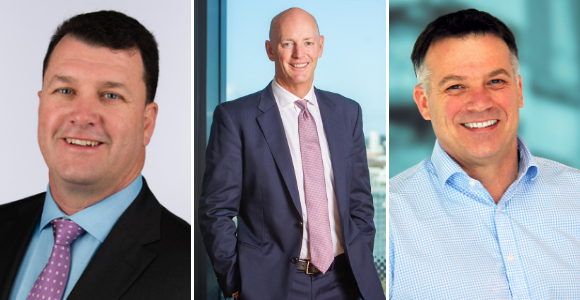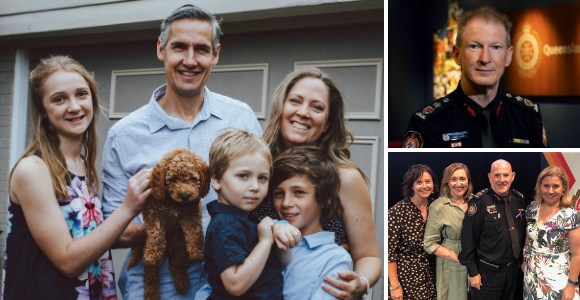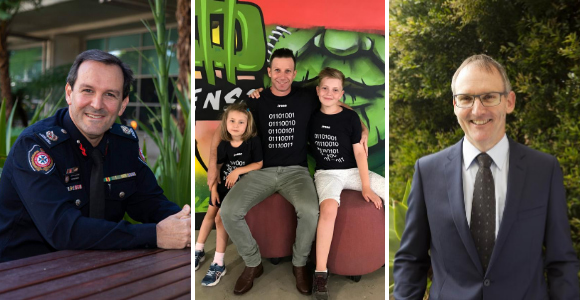The workplace is where we can achieve pay, position, and power, which is why it’s such an important focus when trying to achieve gender equality. But with government reports revealing that women’s careers continue to be held back by biases and difficult workplace cultures, it’s clear we have a long way to go. It’s also clear we need more male allies in the workplace.
What is a male ally?
A male ally is a man who actively supports the endeavor of gender equality, which would mean all genders have equal ease of access to the same opportunities and resources. To help more men become the best male allies they can be, we reached out for first-hand advice from some of the great men working for equality in the workplace right now.
How do you believe men can become better allies to women?
Tom Bills | National Brand Partnerships Leader, Lion:
It is up to men to understand and consider the impact of male privilege, and the key issues women face in the workplace and more broadly in society. Promoting the acceptable standard of fairness and equality isn’t a big ask. We need to show leadership and influence male colleagues and peers to do the same – calling out and coaching others when their behavior is unacceptable.
Phil Fraser | CEO of QInsure, QSuper:
Men can be better allies by not taking over the room, by encouraging women into the discussions and the diversity of thinking. Be aware of the environment and leading by positive values, supporting women by encouraging participation and leadership from women. Be a role model by calling out bad behavior and ensuring that you advocate and promote positive values.
Brad Yelland | Chief Technology Officer, BAE Systems Australia:
While a woman’s potential to succeed and add value as an engineer is the same as a man’s, they have different strengths and weaknesses. By supporting their weaknesses and leveraging their strengths, just like with men, then not only will the full potential be realized, but the whole (a team of male and female engineers for example) will be better than the sum of the parts due to the diversity of thought and actions.
Jonathon Rossiter | Superintendent for Site Operations Centre, OZ Minerals:
In the workplace, I think it all starts with an acknowledgement that women are capable of doing any role that men can do, particularly in industries which have typically been male dominated in the past. We forget sometimes that just because a role has typically been carried out by a particular gender it doesn’t rule out the other from succeeding in the same role. Secondly, just simply remembering that everyone should be made to feel welcomed and have their voices heard.
Con Balaskas | Managing Director, Motorola Solutions:
Men can be better allies by building relationships with women and by acknowledging the gender inequalities that exist. This can also be achieved through listening actively and not making assumptions, participating in events, gaining experience and by being a champion for social justice.
Mark Roche | Deputy Commissioner, Readiness and Response Services, Queensland Fire and Emergency Services:
I believe mentoring relationships between men and women are mutually beneficial regardless of who is the mentor or mentee. The sharing of professional experiences from a female perspective assists male mentors and mentees to think differently, and challenges unconscious biases, attitudes and viewpoints which may be negative towards women. This in turn makes men better allies to women in the workplace and beyond.

Robert Bedwell | CEO, J.P. Morgan, Australia and New Zealand:
Firstly, men need to understand the clear organizational benefits that diversity unlocks and the evidential research that underpins that rationale. Secondly, as hiring managers and leaders, commit to recruiting and retaining talented women in order to build a diverse team.
Thirdly, listen to women’s voices – and all voices – across the organization to understand the problems and actions required, and to inspire trust and build respect. Take the time to learn about women’s realities in all aspects of their lives to understand the whole picture.
Fourthly, and importantly, be empathetic and practice self-reflection. Critically assess and ask the hard questions – do your teams and organization truly have a diverse representation of talent? Are practices of fairness and transparency occurring? Unconscious bias exists within the workplace and it must be called out to move forward.
Steve Honey | Senior Director – Global R&D Tech Transfer, CSL Limited:
Men need to actively ask themselves, “How would I feel in this situation now if I was female?”. For example, not feeling comfortable being able to go for a trail run by themselves or getting to their car in the dark after work, or being in a meeting as the only woman with nine men.
I also think men are heavily influenced by the environment they are in and the leaders they have. Leaders need to actively role-model positive, reinforcing behaviors and talk about and promote those behaviors.
What can a male ally do on a day-to-day basis in the workplace to drive gender equality?
Mark Roche | Deputy Commissioner, Readiness and Response Services, Queensland Fire and Emergency Services:
One of the first steps towards the promotion of women in the workplace is the eradication of unacceptable behaviors. Allies that witness negative and/or derogatory words and actions towards women in the workplace need to be active and vocal in their aversion to these behaviors — offenders need to be called-out, and unacceptable behaviors need to be highlighted. It is one thing to refrain from such behaviors yourself, but an ally means making others accountable.
Martin Chappell | GM Minerals and Energy, Motorola Solutions:
Words can be shallow, actions always speak louder. So, an ally can support all the programs that are in place to change inequality, eliminate sexism and continually promote the positive impacts women have for both people and business.
Drew Bradford | Executive, Markets – NAB:
A diverse workplace benefits everyone. I lead a global team and have a key role in advocating the importance of diversity well as encouraging the conversation on the short and long term benefits of inclusivity. I focus on ensuring we discuss these topics as a team so we can work together to embed the benefits as part of what we do to deliver to our colleagues and customers every day. We have to encourage change and experiment in the way we work for better long term outcomes.

John Costello | Commercial Superintendent, Evolution Mining (Cowal):
Be fair, be honest, be involved, and be available. In traditionally male dominated industries, extra effort and vigilance is required to ensure a culture is inculcated that does not bias one gender over another, but I do believe that just applying the fundamentals goes a long way to injecting such a culture in the workplace.
Adam Watson | Head of Business Development and Vice Chair at the Defence Teaming Centre, BAE Systems:
An ally needs to be observant and act. By doing these two things you can establish an acceptable or exemplar culture where everyone is included and they can perform. Poor behaviors need to be called out. I don’t think women are seeking to be treated differently.
Greg Leach | Commissioner, Queensland Fire and Emergency Services:
One of the most important actions an ally can take is to amplify women’s voices. Make a point of including women into conversations and giving them opportunities to weigh in on decisions. This is particularly important if there are no women in the room – take the time to seek out women’s perspectives and incorporate those into the final decision.
When women are present, ensure their voices are heard and pay attention to check that male voices are not dominating the discussion. And if you witness a male colleague taking or co-opting a woman’s idea, call it out. Make sure credit is given where it is due. Finally, call out inequality when you see it. Make a personal commitment to addressing poor behaviors, such as bullying, harassment, stereotyping and sexist jokes, when you witness it.
Phong Vuong | Site Manager, Programmed Industrial Maintenance:
Look for workplace change and challenge the norm. Why do traditional roles need to be male dominated? Is it because of physical strength? If it is, then what mechanical aids can we introduce into the workplace to ensure that physical strength is no longer a barrier to employment. I currently have three female scaffolders in my site team. This type of work has “always” been carried out by males. With support and the right tools and attitudes, the job can be done regardless of gender.
Nick Blackwell | Project Manager, Woolworths Group:
Allies stay informed, promote gender equality and speak out against sexism. At times I have felt lonely or struggled to stand up for what’s right, especially when around men who’d prefer to protect their privilege. The more allies that exist within an organization, the less this mentality is able to continue.

Paolo Spinetti | ANZ Environment and Safety Manager, USG Boral:
If we see an environment that we wish to change, it doesn’t change without action. Action can be as simple as talking about it. It might only have an impact on one person, but that’s one person more than if you remained silent.
Steve Schofield | Group Head of Human Resources and Industrial Relations, Downer Group:
Encourage a legitimate partnering approach and call-out and address evidence or episodes where both women and men are not working to see one another successful.
Why is being a male ally important to you?
Tim Oudenryn | National Planning & Business Development Manager – Asphalt, Boral Australia:
In addition to the fact that we should all be fighting for equality for everyone worldwide, I have also seen first hand how gender diversity and diversity in general in the workplace can significantly improve outcomes.
Drew Bradford | Executive, Markets – NAB:
The only way to be a sustainable forward looking business is to be diverse, agile and adaptable. Businesses must embrace diversity and driving this as a leader at NAB is important to me. Being a male ally is important in supporting my immediate team, the organization and the broader community to grow and achieve together. Great businesses are diverse and inclusive and must continue in this way to survive.
Stephen Smith | Assistant Commissioner Human Capital Management, Queensland Fire and Emergency Services:
People need to know they are not alone, and that they have other people they can reach out to for support, advice, or just an ear to listen at any time from someone that shares their values. I live in a household of equals with women who live their lives fully and follow their own paths – that makes me very proud. My wife is a rock and possesses a strength that inspires me and I have two young, intelligent, and empowered daughters who deserve to live in a world that sees them and treats them as equals to anyone else.
Dan Wood | Manager – Public Sector Innovation, Business Consulting, EY:
Many workplaces and service providers still hold an assumption that the default parent is female. This assumption needs to be broken from all angles, by all genders. In support of this, I’ve shared my story publicly both within workshops and during one-on-one conversations to provoke a conversation about the need for flexibility for all, to enable everyone to find an equitable balance between career and family, regardless of gender.
Phil Carbins | State Strategy & Program Manager NSW/ACT, SUEZ Recycling & Recovery:
Making a positive difference to our environment requires everyone’s involvement. That outcome can only be achieved with the engagement and commitment of everyone.

Sergio Cinerari | Chief Operating Officer – Australian Operations, Downer Group:
I genuinely believe that diversity in thinking is important and drives better outcomes for societies. One or single source type thinking will lead to narrow thinking and predictable outcomes. When the full range of human thinking is applied, however, the outcomes for societies are enriched. If humans learn from experience then it is my view that you better engage all the humans and capture all the experience to inform thinking and solutions, not just half of them.
Michael Stange | Global Head of Product Engineering, Iress
Being an ally is important to me as I believe that gender equality is fundamentally important to the realisation of human rights for all. I share a responsibility to create a society in which women and men enjoy the same opportunities, rights and obligations in all spheres of life.
I am also concerned by the underrepresentation of women in the STEM industries and the leading causes contributing to this. I see this as a serious problem because of the ever-increasing social and global impact these industries are having and how they are shaping our world. The underrepresentation of women means missed market opportunities, less innovation, and less diverse products and services being produced.
Want to be surrounded by supportive colleagues like these?
If you’re looking for a workplace dedicated to supporting women, WORK180 is here to help. You can find exciting opportunities with our trusted and trailblazing Endorsed Employers — including the fantastic companies featured in this article — right here on our jobs page.
